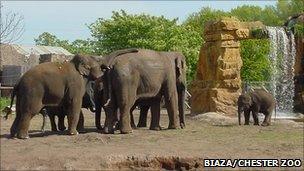RSPCA calls for ban on UK zoos importing elephants
- Published

There are around 70 elephants in 13 zoos around the UK
Animal protection charity the RSPCA has called on the government to ban zoos from importing elephants.
The organisation said the creatures were "suffering" and more had to be done to address issues surrounding their welfare.
On Thursday a government-commissioned report into elephant welfare said if zoos wanted a long-term "breeding population", they had to import.
There are about 70 elephants living in 13 zoos around the UK.
The RSPCA's call was in response to a report into elephant husbandry in zoos by the Zoos Forum body, external, an organisation that advises the Department for Environment, Food and Rural Affairs (Defra).
The forum had been commissioned by the government to independently review a 2008 report by Bristol University scientists, external, which looked at general welfare issues.
The 2008 report was jointly funded by Defra, the RSPCA, the British and Irish Association of Zoos and Aquariums (Biaza), and the International Fund for Animal Welfare (IFAW).
The Zoo Forum's review suggested that if a ban was put in place, there would be "no merit" in the UK trying to build its own "separate genetically-isolated population" of elephants - which in any case would be quite small.
"If the aim is for a breeding population in the UK in the long term, there would be a need for animals to be trans-located between the UK and other European countries," they said.
Instead the Zoo Forums body recommended the establishment of an independent Elephant Advisory Group that would monitor standards.
But a statement issued by the RSPCA, scientist Dr Ros Clubb said the charity was disappointed the report "did not recommend an outright ban" on importing elephants to UK zoos."
She said: "The RSPCA believes that until solutions to the extensive and serious welfare problems can be found, we should not be introducing more elephants.
"Elephants are, without question, suffering in zoos.
"Adding yet more elephants to an ailing population simply masks the problems and if drastic improvements to these problems cannot be found, the RSPCA believes zoos should phase out elephant-keeping."
'Surprised' by stance
In 2008 a study in the journal Science which compared wild, captive and working elephants found that living in zoos can significantly shorten the animals' lives.
A Defra spokesperson said: "We believe that everything possible should be done to ensure elephants' health and wellbeing in zoos. We welcome the important work already being done by zoos to improve the environment and husbandry of their elephants, to enrich and improve their lives.
"Defra is considering the recommendations set out in the forum's report before deciding how to go forward."
And the British and Irish Association of Zoos and Aquariums (Biaza), which represents zoos in Britain and Ireland, said it was "surprised" by the RSPCA's stance.
In a statement zoo biologist Georgina Groves, who is overseeing the auditing of all the UK and Irish elephant collections, said: "Biaza are surprised and disappointed by the RSPCA 's disregard for the Zoos Forum's expert review carried out on the Bristol University research of elephant husbandry in UK zoos, and their consequent call to stop the introduction of new elephants into the UK."
.jpg)
An independent panel focusing on elephant husbandry has been set up
She said Biaza's members had already set up an independent elephant welfare group to help maintain the "highest standards" in elephant care and it agreed with the Zoo Forum's panel and recommendations.
Richard Field, the director of Whipsnade Animal Park, told the BBC there were a number of reasons why elephants and other endangered species needed to be kept in zoos.
"It may be that they are being bred for future reintroduction, it may be that their populations in the wild are going through dramatic declines - as is the Asian elephant - and we need insurance populations."
He said the knowledge gained about elephant behaviour was then used to help help preserve the animals in the wild.
He welcomed the Forum's report and said some of the recommendations made were already being put in place.
Discussing the RSPCA's decision not to join the Biaza panel, he said: "We need the RSPCA to help and work with us, not refuse to join with us."
- Published16 July 2010